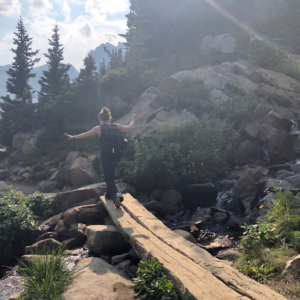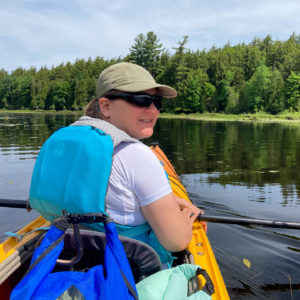Meet our organizing committee!

Alec Aitken
I am beginning my 30th year as a faculty member in the department of Geography and Planning, University of Saskatchewan, where I hold the rank of Professor. I am honoured to be a recipient of the U of S Master Teacher Award and recognized as an Indigenous ally. I completed degrees in Biology (B.Sc.), Geography (M.Sc.), and Geology (Ph.D.). Before my university appointment, I worked as a soil surveyor with Environment Canada and as a fisheries biologist with Fisheries and Ocean Canada. My research is focused on northern environments and includes projects in Quaternary geology, marine geology, and marine biology. I have also contributed to research projects in geoarchaeology in the Province of Saskatchewan with colleagues in the department of Archaeology and Anthropology. My teaching is focused at the undergraduate level and includes courses in introductory earth sciences, field techniques, geoarchaeology, geohazards, geomorphology, and northern studies. I am actively engaged in land-based learning and am a champion of undergraduate research. I enjoy working with undergraduate student research assistants on projects that explore the natural environment of the Canadian Arctic.
Outside of my work as a faculty member, I am engaged with my wife in the stewardship of 40 acres of woodlands and horse pastures near the City of Saskatoon in central Saskatchewan. We enjoy our time with the animals we share this space with; our 2 horses, 2 large dogs, and 2 cats, as well as the wildlife that includes whitetail deer, ground squirrels, chipmunks, song birds, grouse, coyotes, and the occasional red fox and moose.

Amanda Robin
I am a PhD Candidate in the department of Ecology and Evolutionary Biology at the University of California, Los Angeles where I study the decision making and personality of wild squirrels. I am the founder of the Community College Field Biology Alliance, a graduate student run, 9-month field research internship for community college students. After graduation Amanda hopes to continue to contribute to the efforts of building a bridge between community college students and biological field research opportunities. When I am not coordinating internship programming, I can likely be found in the forest observing squirrels for my dissertation work or crocheting!

Bridget Mulvey
I earned my Ph.D. in Curriculum and Instruction from the University of Virginia and a master’s degree in geological sciences from Indiana University at Bloomington. I teach courses in science education and early childhood education for pre-service and in-service teachers and taught preschool-16 science for 11 years in formal and informal settings. My teaching and research focus on teachers and students doing science inquiry and understanding characteristics of scientific knowledge and inquiry to improve access to science learning, careers, and action for change for underrepresented groups with a focus on minority, female, and special education teachers and students.

Carol Colaninno
I am Carol Colaninno, a research associate professor at the Southern Illinois University Edwardsville STEM Center. I have two research foci: human-environmental interactions and archaeological education. As an archaeologist, I am interested in understanding the ways people in the past used fish populations and communities. This work involves collaborations with fish ecologists to understand how human-fish interactions have changed through millennia. My work has led me to investigate the stable isotopic composition of bone collagen to understand how biochemistry of collagen in fishes and other organisms has changed over time. My other line of research is understanding how people teach and learn archaeological and other STEM topics. Much of this work has focused on building more student-focused, field-based research programs that incorporate a strong undergraduate research component. With archaeology so focused on field-based learning, I hope to best understand how to build field-based learning models that are safe, inclusive, and follow best practices in teaching and learning.

Deborah Lichti
I am an education preceptor in the Interdisciplinary Science Learning Laboratory at the University of Delaware. I help teach the integrated introductory biology and chemistry course, and mentor graduate and undergraduate teaching assistants. I am a trained aquatic ecologist with most of my work having been in the field and spanning from the Great Lakes to the estuaries of North Carolina. I have expanded to now include discipline-based education research into my research focus. My research focuses on how instructors help students through perceived failure in laboratory and field courses. I am also interested in interdisciplinary thinking of first-year students and determining how field experiences during first-year introductory biology and chemistry laboratories affect students to be stewards of the environment.

Mallory Rice
I am an Assistant Professor in biology at California State University San Marcos (CSUSM). I attended Sonoma State University where I studied biology as a McNair Scholar. While completing my PhD at the University of California, Santa Barbara in marine ecology, I spent several months abroad doing field research on the coral reefs of Mo’orea, French Polynesia. After completing my PhD, I became trained in science education research while a postdoctoral scholar at San Francisco State University where I investigated student perceptions of equity and inclusion in biology classrooms. At CSUSM, my science education research lab focuses on how to make STEM college classrooms more inclusive and equitable spaces for all students, the experiences of K-12 STEM afterschool program facilitators, and how to foster more inclusive field experiences for ecology students.

Meghan Cook
I am currently a Postdoctoral Fellow at Purdue Northwest in Inclusive Course Design. I work with the Director of the Center for Faculty Excellence to support the development of courses and implementation of instructional practices that promote inclusive excellence in teaching and learning.
I hold a Ph.D. from the USF School of Geosciences, specializing in Geoscience Education. My research interests focus on aiding in the efforts to increase diversity, equity, and inclusion in the STEM fields. I use qualitative methods to study the impacts of different learning environments on a student’s affective domain. My research informs best practices for a variety of learning modes in STEM curriculums. Current projects include: (1) investigating classroom interventions that lead to positive affective gains in a student’s sense of belonging in STEM; (2) developing best practices for field trips to decrease barriers to diversity, equity, and inclusion; (3) creating more accessible field trips, e.g., virtual reality field trips; (4) and producing a podcast (Calling: Earth) that interviews geoscientists about their research in an effort to make the science more relatable to a broader community.

Samuel C. Nyarko
I am a Postdoctoral Fellow in the STEM Education Innovation and Research Institute at Indiana University & Purdue University, Indianapolis. I carry out research in diversity, equity and inclusion, collaborative learning practices and climate change education. I am a social constructivist and share in the philosophy that diversity in knowledge creation is the closest we can go to achieve accurate knowledge.
I hold a Ph.D. in Science Education – Geoscience, M.Phil.. In Geology, and a BS. In Geological Engineering.


